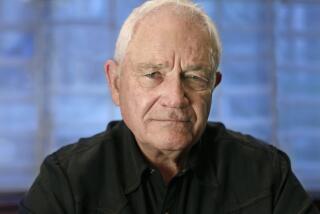Robert Sherman dies at 86; songwriter best known for ‘Mary Poppins’
At the Academy Awards ceremony in 1965, Robert and Richard Sherman already had accepted their Oscar for best score for “Mary Poppins” when they returned to the stage to pick up another statuette for best song, “Chim Chim Cher-ee.”
Having already thanked everyone, Robert Sherman told the audience that all they could add was “Supercalifragilistic....” Then, as often happened when they spoke, Richard Sherman completed his brother’s sentence by saying, “expialidocious.”
FOR THE RECORD:
Robert Sherman: In the March 7 Section A, the obituary of songwriter Robert Sherman, who with his brother Richard wrote music for Disney films and other productions, said they won three Grammy Awards. In fact, they were nominated three times but won only once, for best original score written for a motion picture or television show, for “Mary Poppins.”
The tongue-twister of a song title from the blockbuster 1964 Disney musical powerfully reminded viewers that the brothers wrote irresistibly upbeat songs that spoke to everyday people.
As film critic Leonard Maltin told the Los Angeles Times on Tuesday: “You can’t help but smile when you sing or hum a Sherman brothers song.”
On Monday, Robert Sherman, who grew up and lived most of his life in Beverly Hills, died at the London Clinic of an age-related illness, his family said. He was 86.
The Shermans were Walt Disney’s songwriters of choice, their music for “Mary Poppins” including the jaunty “A Spoonful of Sugar” and the somber “Feed the Birds.” For Disneyland attractions, the brothers wrote such instantly familiar tunes as “It’s a Small World” and “The Tiki Tiki Tiki Room.”
“My brother Bob was a poetic soul with limitless imagination and talent,” Richard Sherman said in a statement. “He was my loyal friend all through the years.”
“A piece of our childhood has been taken away,” film music historian Jon Burlingame said. “They wrote some of the most resonant songs of our childhood, and that doesn’t apply only to those of us who grew up in the 1960s but also to those born ever since.”
Their career milestone came with “Mary Poppins,” the tale of an English nanny and her unruly charges starring Julie Andrews and Dick Van Dyke.
The Shermans already had done work for the Disney Studio, including writing the 1959 hit “Tall Paul” for Annette Funicello, when Disney handed them a small book by British author P.L. Travers in 1960.
He told them to read it and tell him what they thought.
“We said it would make the greatest musical fantasy of all time,” Richard Sherman recalled in a 1993 joint Houston Chronicle interview with his brother. “Of course, that book was ‘Mary Poppins.’ So we underlined some chapters that we felt were really musical. And when we showed Walt our notes and played the song sketches, he pulled out his book, and he’d underlined the very same chapters.”
It was, Robert said, “one of the greatest feelings we’ve ever had.”
Van Dyke recalled that the Sherman brothers were “deeply involved” throughout the filming of “Mary Poppins.”
“They were always on the set helping Julie and I with our interpretation of the songs,” he told The Times on Tuesday. “They had a lot to do with the atmosphere, the lightness.”
The two brothers, Van Dyke said, “were opposite ends of the pole as far as their personalities were concerned. Robert was the somber one. He kept within himself. Dick was gregarious and outgoing and loves to perform.
“As songwriters, they were a perfect combination. The emotion was Robert and the fun was Dick’s part. They were made by God for Walt Disney. They somehow managed to convey Walt’s meaning in those songs.”
Explaining their approach to songwriting in a 1969 interview with The Times, Robert Sherman said: “We don’t like the dark side of things, and we want only to entertain people. We like singable songs as opposed to, say, performers’ songs. We don’t write for someone, we write for everyone.”
Disney, who died in 1966, was especially fond of “Feed the Birds,” which he predicted would replace Brahms’ Lullaby and which reportedly caused him to cry every time he heard it.
When the brothers walked into Disney’s studio office the day after the ceremony, with their Oscars in hand, the film legend gave them a characteristically restrained response.
As Robert Sherman recalled in a 1992 Times interview, Disney told them: “The bases were loaded, we hit a home run and that’s great. From now on, just try to get on base.”
Robert Sherman’s son Jeff said the brothers “walked in on a cloud” and Disney, who had a warm relationship with them, was just trying to keep them humble.
“I’m sure he smiled as they left,” Jeff Sherman said Tuesday.
The Sherman brothers contributed songs and scores to many other Disney films, including “The Parent Trap,” “That Darn Cat!,” “Winnie the Pooh and the Honey Tree,” “The Gnome-Mobile,” “The Jungle Book,” “The Aristocats” and “Bedknobs and Broomsticks.”
They also wrote “It’s a Small World (After All”) for an attraction at the 1964 New York World’s Fair, a tune heard repeatedly at Disney theme parks.
Among the other films they later provided music and songs for are “Chitty Chitty Bang Bang,” “Snoopy Come Home,” “Charlotte’s Web,” “The Adventures of Tom Sawyer,” “Huckleberry Finn” and “The Slipper and the Rose.”
In addition to their two Oscar wins, the Sherman brothers received seven other Academy Award nominations and won three Grammy Awards. They also received 24 gold and platinum albums and were inducted into the Songwriters Hall of Fame — as well as receiving a star on the Hollywood Walk of Fame.
“The Sherman brothers’ legacy goes far beyond the craft of songwriting,” multiple Oscar-winning composer-songwriter Alan Menken said in a statement. “There is magic in their songs and in the films and musicals they breathed life into.”
In 2008, President George W. Bush awarded the Sherman brothers the National Medal of Arts for creating music that “has helped bring joy to millions.”
The son of Tin Pan Alley songwriter Al Sherman, Robert was born in Brooklyn on Dec. 19, 1925; his brother Richard was born June 12, 1928. The family moved to Beverly Hills in the early ‘30s when the senior Sherman got a job writing songs for the movies.
Robert Sherman served in the Army during World War II. He was one of the first American soldiers to enter the Dachau concentration camp and later had his kneecap shattered by a Nazi bullet. He recovered in hospitals in England, where he moved in 2002 after the death of his wife, Joyce.
After the brothers teamed up, their first song to be recorded was “Gold Can Buy You Anything But Love” for Gene Autry in 1951. They later wrote Johnny Burnette’s 1960 hit “You’re Sixteen.”
As for how they divided writing the words and the music for their songs, the brothers’ standard reply was, “He writes the words and the music, and I write the music and the words.”
Jeff Sherman said, “Richard was primarily the composer and Robert was primarily the lyricist, but they both did both.”
Despite their long and close working relationship, the Sherman brothers didn’t socialize for a couple of decades.
“Bob and I have great love and respect for one another, and during our professional lives we maintained a facade of unity,” Richard Sherman told the Toronto Star in 2009 when the documentary “The Boys: The Sherman Brothers Story” was released.
“But in order to keep working together we came to an agreement to live our personal lives apart, completely separate,” he said. “We were comfortable working together, but otherwise it would have been explosive.”
The documentary came about after Robert’s son, Jeff, and Richard’s son, Greg, connected at the 2002 London opening of the stage version of “Chitty Chitty Bang Bang.” The cousins said they hoped the film would make the public more aware of the professional contributions of the Sherman brothers and start a personal dialogue between their fathers.
“So many personal details are hidden in their songs,” Greg Sherman said in the Toronto Star. “And for such different personalities, they really had a lot in common: It’s impossible to tell who wrote the music and who wrote the lyrics.
“We are different people,” Richard Sherman said in the 2009 article. “In the broadest terms, Bob is an introvert who wanted to write great novels, and I was the showman. I loved to perform and he’d rather sit in a corner reading a book.”
But, he said: “Success and creativity won out over petty differences. There was no way we were going to let those differences destroy our work.”
Besides his brother, Sherman is survived by his four children, Jeff, Robert, Laurie and Tracy; and five grandchildren.
A public funeral service will be held at 1 p.m. Friday at Hillside Memorial Park and Mortuary in Los Angeles.
Los Angeles Times staff writer Elaine Woo contributed to this report.
More to Read
Start your day right
Sign up for Essential California for the L.A. Times biggest news, features and recommendations in your inbox six days a week.
You may occasionally receive promotional content from the Los Angeles Times.







